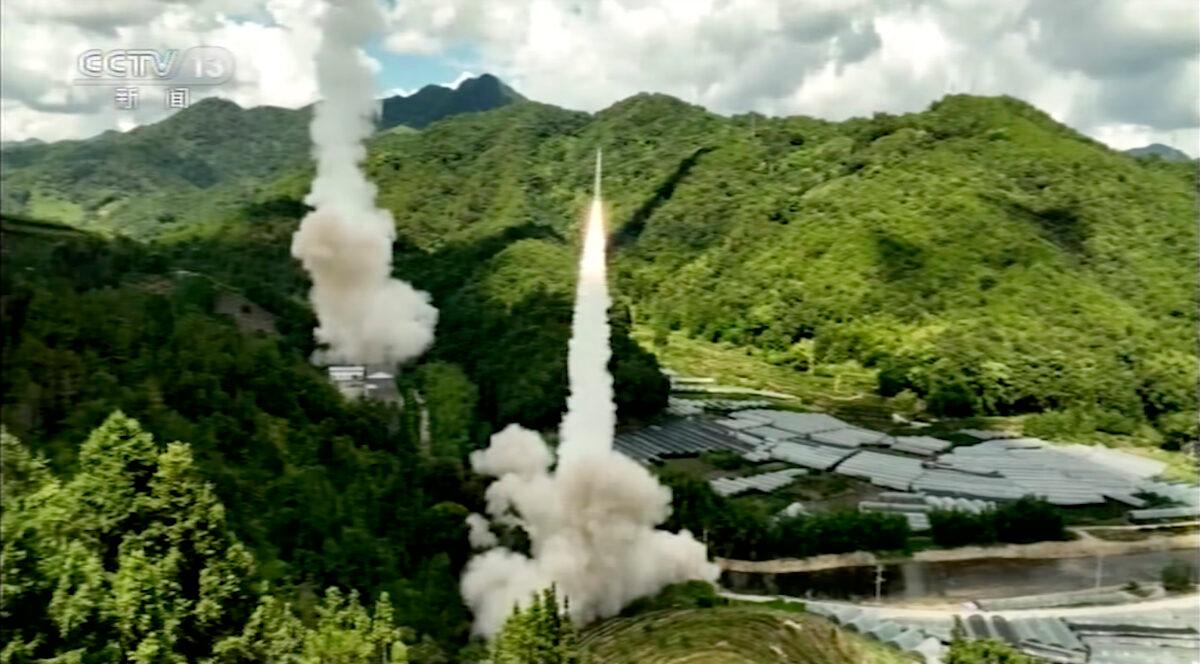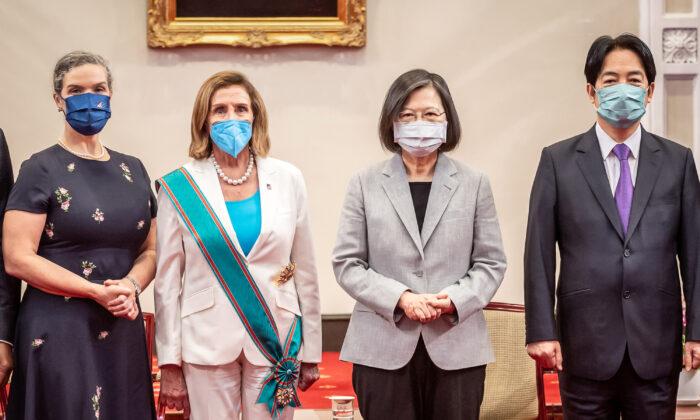U.S. House Speaker Nancy Pelosi’s Taiwan visit came and went, but the crisis created by China in the Taiwan Strait continues to develop.
The Chinese Communist Party (CCP) is celebrating the great success of turning the crisis into an unprecedented opportunity to advance its coercive policies to bring Taiwan under its control. In the United States, there is worry about the deteriorating bilateral relations between the two largest economies.
Here is our take on the situation.
The ongoing crisis in the Taiwan Strait is a long-planned creation of the CCP, and Pelosi’s visit to Taiwan only forced the CCP to implement it early. In our view, China’s real intention is to show the United States and its allies, as well as Taiwan, that the People’s Liberation Army (PLA) already has the capacity to blockade Taiwan, cutting off its lifeline such as energy supplies and export and import shipments, to prevent Taiwan’s effort of becoming a normal member of the international community, with the help of the United States and its allies.
By pushing the island into a desperate corner, the CCP expects to achieve a forced annexation without firing a shot. Meanwhile, Beijing intends to use the occasion to change the status quo by breaking through the implicitly agreed center line, intruding upon Taiwan’s territorial waters and airspace, challenging Taiwan’s sovereignty, and eroding it through the routinization of the violation of Taipei’s sovereign rights.

Domestically, the crisis has offered Chinese leader Xi Jinping a perfect excuse to justify his third term in the 20th Party Congress to be held in late October or early November. Beijing’s overreaction to Pelosi’s visit aims to create a strongman image for Xi. The illusion that Xi seeks to create is that China needs this great and wise leader to remain in power so that he may guide the party-state through this serious crisis and lead the country to realize its dream of rejuvenating the Chinese nation.
Xi’s showmanship does not mean China is ready to have a showdown with the United States. In fact, Beijing’s eight sanctions are diplomatic gossamer. This is because the party-state is not strong enough to face the United States—it needs another strategic opportunity to catch up. It still needs American markets, capital, energy, and technologies. China created the crisis to gain more concessions from the United States. In other words, China needs the United States more than otherwise.
On the other hand, the Biden administration still cannot see that Taiwan is only the first step in the CCP’s global domination. The administration seems to believe it can manage the China risk while seducing the CCP into cooperating on the climate change agenda, all while Wall Street and Silicon Valley continue to profit from the relationship. Therefore, U.S.-China relations will not deteriorate as it appears.

Another one of China’s wolf-warrior diplomacy incidences is also unsettling. The Chinese ambassador to France, Lu Shaye, has made equally aggressive and dangerous remarks that anticipate a genocide if Beijing gains control.
Moreover, Beijing has launched a global campaign to ensure its “one-China” policy. Qin Gang, Chinese ambassador to Washington, even published an op-ed piece in The Washington Post, claiming that “the one-China principle is part of the postwar international order and has become a general international consensus.”
Such revisionism distorts historical fact. The CCP has illegally seized power and cast the “one-China” policy myth on all countries by force and inducement, and now it is reciting this myth to force the world to recognize the legitimacy of the party-state. The United States and its allies should not fall into this trap.
To deter Pelosi from visiting Taiwan, Xi actually threatened President Joe Biden to “play with fire and you will burn yourself,” which was followed by the implementation of the military exercises around Taiwan. These were intended to intimidate Taiwan, warn the United States, and normalize bellicose exercises that are intended to provide blockade in all but name of Taiwan’s foreign trade.
In the face of this reckless violation of international law, peace, and international trade, the United States’ response has been weak. There has been no recall of its ambassador in Beijing, no official protests regarding China’s invasion of Taiwan’s territories, and USS Ronald Reagan is not prominent when it should have made a port call in Taiwan.
This has enabled China to establish a new reality in international law that Taiwan’s sovereignty is disputed. This is unacceptable. The United States, its allies, and the rest of the world must reject it.
More importantly, the United States must immediately employ effective measures to counter the CCP’s aggression and end its blockade of Taiwan.



